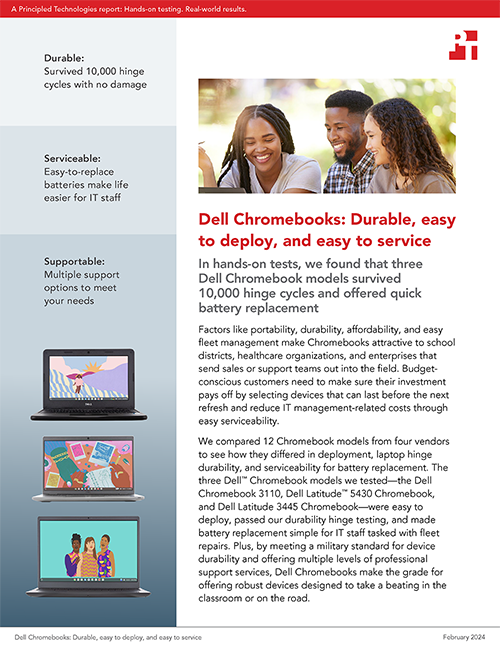
As affordable, highly portable, and easily managed devices, Chromebooks are often a great fit for the device fleet requirements of school systems, healthcare organizations, and corporate teams on the go. But Chromebooks can vary widely in quality and capabilities. When it’s time for buyers to start researching options for a hardware refresh, it’s important to consider additional factors beyond the tech specs and upfront cost. Ease-of-deployment, serviceability, and the durability to survive years of wear and tear could all play a role in determining whether the next Chromebook refresh goes down as a wise investment or a costly mistake.
We went hands-on with 12 Chromebook models from four vendors to see how they differed in ease-of-deployment, laptop hinge durability, and serviceability for battery replacement. We found that the three Dell Chromebook models we tested—the Dell Chromebook 3110, Dell Latitude 3445 Chromebook, and Dell Latitude 5430 Chromebook—were easy to deploy, handled 10,000 hinge cycles with no noticeable defects or wear, and offered quick and simple battery replacements that could ease the maintenance burden on IT staff.
In addition, the Chromebook 3110 and Latitude 3445 Chromebook are certified as having passed military test standards for device durability in difficult environmental conditions. That kind of ruggedness, along with Dell’s multiple levels of professional support, can give Dell Chromebook buyers confidence that they’re getting gear that will stand the test of time in school or on the road.
For more details about our Chromebook comparison tests, check out the report below.
Principled Technologies is more than a name: Those two words power all we do. Our principles are our north star, determining the way we work with you, treat our staff, and run our business. And in every area, technologies drive our business, inspire us to innovate, and remind us that new approaches are always possible.






